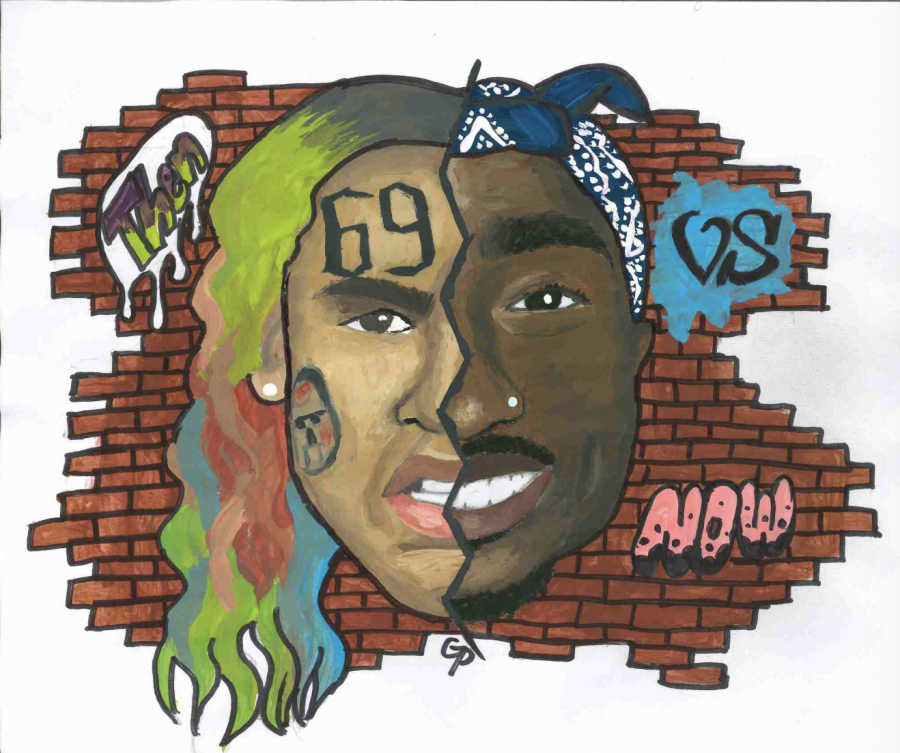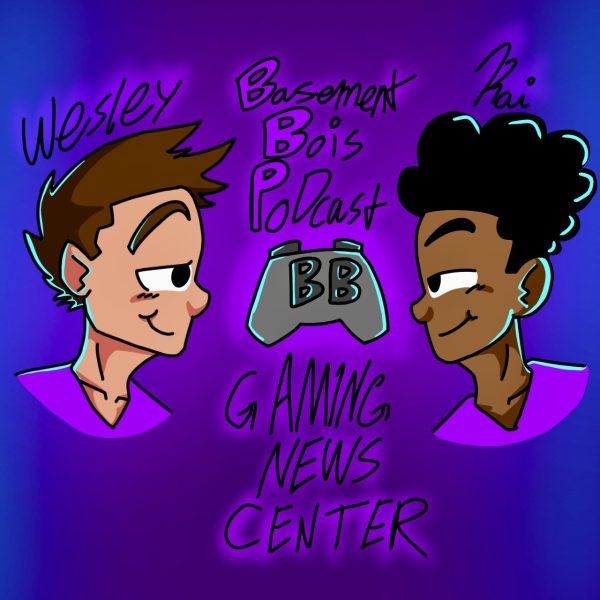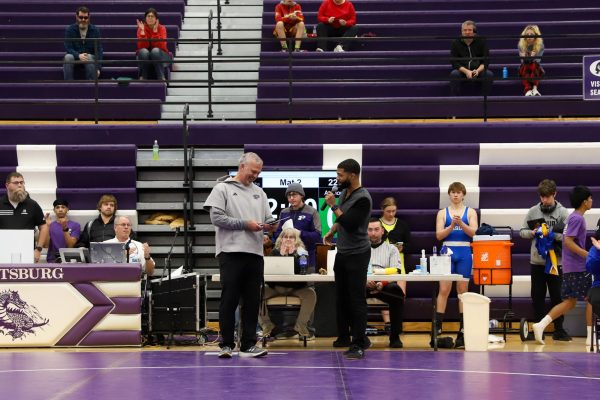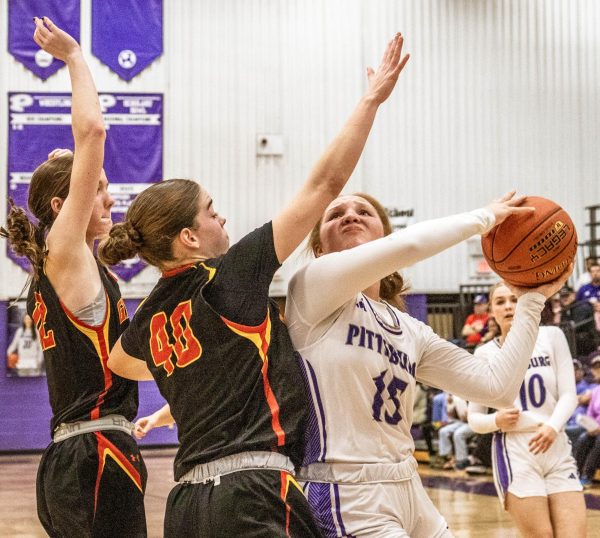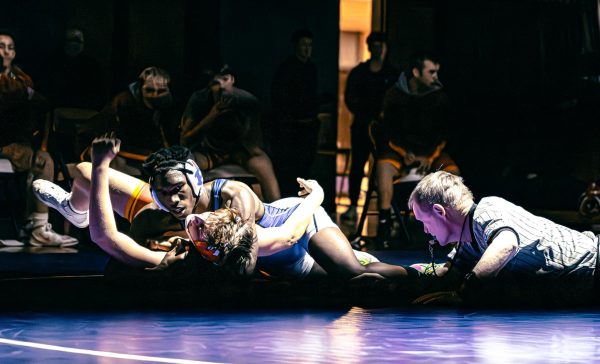Modern Hip-Hop Gets a Bad Rap
Photo by: Grace Puckett
This piece from senior Grace Puckett showcases two conflicting sides of hip-hop: lyrical and mumble. The left half of the face is modern rapper 6ix9ine while the right is legendary rapper 2Pac.
Most teens nowadays may see hip-hop as something that they can turn up to at school dances, or just as a great background sound for their TikToks.
But the roots of hip-hop lie far deeper than that.
Hip-hop is a genre literally and figuratively born from the fire.
It emerged in the economically disadvantaged South Bronx in the mid-1970s when entire apartment complexes would regularly go up in flames due to intentional decreases in firefighter availability in black communities by local government, according to the New York Post.
Traditional hip-hop would tackle major social issues, such as disproportionate incarceration rates of African-Americans.
Tupac Shakur said in his song ‘Changes’, “It ain’t a secret, don’t conceal the fact: The penitentiary’s packed and it’s filled with blacks.”
New-school hip-hop, on the other hand, is characterized by an emphasis on catchy melodies rather than lyrical content.
In a 2014 interview, battle rapper Loaded Lux coined the label ‘mumble rap’ to describe this subgenre.
While many have criticized the style for its incoherent slurring of words, no one can deny its popularity.
Gazzy García, better known by his stage name Lil Pump, is one of the best examples of a modern-day mumble rapper, face tattoos and all.
Lil Pump went five times platinum with his single ‘Gucci Gang’. Throughout the two-minute song, the title is repeated a whopping 53 times.
Let me be clear: I don’t whole-heartedly endorse this form of hip-hop. In fact, I see many problems with it.
Besides the sometimes unintelligible delivery, contemporary hip-hop often objectifies women, encourages unhealthy financial habits and glorifies drug abuse.
Drug abuse in the hip-hop community is a serious problem and has claimed many lives, including famous artists such as Mac Miller, Lil Peep, and Juice WRLD.
That being said, I have to acknowledge the publicity that modern hip-hop has attracted.
2017 was the first year where hip-hop overtook rock as the most popular genre by consumption, according to Nielsen Music’s year-end report.
That gap just keeps growing. In 2019, hip-hop accounted for almost 31 percent of all music consumption in the U.S., according to Statista — more than rock and pop combined at about 15 percent each. Not bad for an industry that Kanye West called “the devil’s music.”
But there is serious pushback against this change in hip-hop.
Many traditional hip-hop enthusiasts have voiced strong disapproval for what they see as regression instead of growth.
This is nothing new. All the way back in 2008, rapper Ice T lashed out at artist Soulja Boy saying that he “single-handedly killed hip-hop.” Joe Budden, J. Cole, and Eminem are all prominent figures who have also publicly denounced the style.
But why is this old-generation versus new-generation dynamic so common?
This can be explained through a psychological phenomenon called ‘rosy retrospection’, in which memories of the past are looked at more favorably than those of the present. In other words, an unnecessarily complex term for nostalgia.
Neuroscientists have found that people prefer music listened to in their formative years of age 12-22. Keeping this in mind, it’s no surprise that classic hip-hop enthusiasts look at today’s music with such discontent.
Perhaps I’m an exception to the rule. I listen to a wide variety of hip-hop music but tend to lean more towards lyrical rap. There’s something about good lyricism that is truly poetic and I can sympathize with classic hip-hop enthusiasts in their concerns.
However, this doesn’t change the fact that they are being unnecessarily pessimistic.
The true lyricists of today are still the top dogs. J. Cole, Eminem, Drake and Kendrick Lamar all dominated record sales in 2019, according to Billboard’s Year-End Charts.
Lamar even became the first non-classical or jazz artist to win the Pulitzer Prize in Music with his 2017 album ‘DAMN.’
Hip-hop goes through trends and phases like anything else, but the proven methods will not fade anytime soon.
Lyricism in hip-hop is not dead, and one could argue it’s more alive than ever. And I believe that if fans of old-school hip-hop gave new music a chance, they could find something they resonate with.
Rapper Snoop Dogg recently said in an interview with Sirius XM Shade 45: “The ones creating it gone live forever but the ones duplicating gone fall off. And it’s a lot of duplicating going on right now.”
Your donation will support the student journalists of Pittsburg High School - KS. Your contribution will allow us to purchase equipment and cover our annual website hosting costs.

This is Jacob's second year on the newspaper staff at PHS. He is also involved in debate, scholars bowl, forensics, math club, key club, FCA,...


